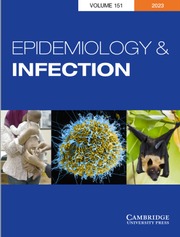No CrossRef data available.
Article contents
Faecal excretion of entero-pathogens in a Pakistani family returning to the U.K. after a visit to Rawalpindi
Published online by Cambridge University Press: 19 October 2009
Summary
The family consisted of two parents and five children. While the father remained in Cardiff, the mother and all the children visited Rawalpindi, Pakistan, for 6 weeks to stay with relatives. Travel was by flight from Heathrow airport to Pakistan and by a short road journey to Rawalpindi. Mrs M. – the mother – as a guest, did no cooking on the holiday. The house which they were living in had a piped water supply, thought to be treated. There was no flush toilet but a commode was available and was emptied daily. All the children had gastro-enteritis symptoms for 2–3 days after arrival. Ru M. – a daughter – had the most severe illness and was treated by a local doctor. Diarrhoea in the three girls persisted on return to U.K. A faecal swab from Ru M. showed her to be excreting S. typhi (degraded Vi phage type). She was admitted to hospital. Faecal samples from the remaining members of the family were taken and examined for entero-pathogens. The father, Fa. M., who had not left Cardiff, had negative stools and remained free from infection. All other family members were excreting one or more enteropathogens, including a Campylobacter sp., three types of Sh. flexneri and one type of Sh. boydii. A subsequent faecal sample revealed that one of the male children, A.M., was excreting S. typhi phage type B2. The two typhoid infections were apparently unconnected.
- Type
- Research Article
- Information
- Copyright
- Copyright © Cambridge University Press 1980


